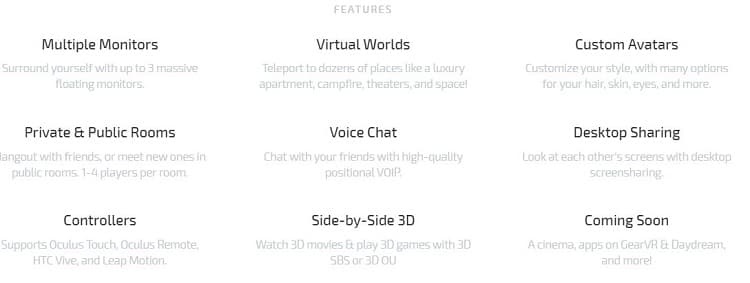7 Virtual Reality Startups Targeting Social Media VR
Table of contents

Maybe the biggest scam to ever befall mankind was the introduction of social media where billions of people generate content for free that is then sold to companies who use it to sell the people who created the content more isht. If you run a company like that where your users do all the work, you could probably just send your CEO off to travel the USA for a year and let your COO spend the majority of their time on talk shows selling books. It doesn’t matter because people will continue to use these platforms so they can stay connected to 947 people, a small number of which they actually have a meaningful relationship with so it’s all worth it, right? Plus, we wouldn’t have thought leaders like Kim Kardashian if it wasn’t for social media and without her, most women wouldn’t have a role model to look up to who inspires them to pursue careers in STEM fashion blogging. While social media may leave a bad taste in our mouths, social media in virtual reality (VR) gets our inner nerd all worked up.
In our world of efficiency, resources, and immediate gratification, the time and money it takes to book, rent, and prepare a space for meeting up or hanging out is starting to feel a bit tedious… especially when you have to take the time to get there. That’s why the last few years have seen a wave of startups looking to eliminate virtually all of the cost, prep, and travel time of gathering people together… virtually. The following VR startups have developed platforms where you can invite friends or co-workers to hang out, dance, watch sports, or work on projects “in-person” from your own couch, equipped with only a VR headset.
AltspaceVR
Founded in 2013, Silicon Valley startup AltspaceVR has already raked in $15.7 million in funding from investors that included Google and Comcast to transform the internet into a 3D, shareable space. AltspaceVR’s virtual reality software extends the web into a holographic experience for each user, and creates the opportunity for each avatar to watch videos, play games, and get work done together with other users within the open web. AltspaceVR also welcomes people to attend live events, from debates to dance parties to Drew Carey comedy shows, with other user-created meetups like “chill sessions” and virtual pride parades on the schedule as well.
Now to be fair, we haven’t tried this out yet, but going to a virtual BBQ and throwing around a virtual frisbee isn’t high on our list of things to do this weekend. AltspaceVR is currently available for free and supports all the major VR headsets.
Pluto VR
Founded in 2015, Seattle startup Pluto VR has received $13.9 million in funding to offer shared presence communication through virtual reality. Pluto VR argues that webcam and mobile communication are less natural and effective than face-to-face interaction, and that with the help of virtual reality, we can now connect, communicate, and collaborate with anyone in the world as if we were in their presence. According to founder John Vechey, the purpose of Pluto is to “help humanity transcend physical location”. We can already connect via voice, text, and video, but Vechey argues that these mediums don’t actually bring us together. Pluto creates the illusion of face-to-face presence, fostering a unique intimacy that he hopes will take virtual communication to a new level. Better update those HR policies to cover virtual harassment because that’s a lawsuit waiting to happen. Pluto VR Alpha is currently being tested on both Oculus Rift and HTC Vive.
LiveLike
Founded in 2015, New York startup LiveLike has taken in $5.91 million in funding to build a VR platform for broadcasters that allows sports fans from around the world to create their own virtual suites for sharing the sporting event viewing experience. LiveLike taps into the crazed enthusiasm of sports fans of every tribe and team, giving them the excitement of the game-day experience through virtual reality from the comfort of their living rooms, like this:
If it’s possible to drink a beer with a VR headset on, we’re in (it is possible actually). LiveLike also emulates immersive, communal aspect of sports fanhood by enabling multiple users to occupy the same viewing space, without the exorbitant expense of renting a stadium suite in real life. At least one broadcaster uses this technology now and you can try it out here if you own any of the popular VR headsets.
Against Gravity

The whole thing is free, so you can imagine that they’ll be getting in bed with companies like Vertebrae in order to make money from selling ads in these virtual spaces. The founder was previously a program manager at Microsoft working on the HoloLens and he claims that social VR is “magical” and not at all like other multiplayer games. Virtual reality users seem to agree with him. According to a great article by Geekwire on this startup, the app has a 98% rating on Steam with 1 in 3 HTC Vive users having played it with over 100,000 people playing the game in 2016 alone. Looks like a pretty cool place to work eh?
Bigscreen
Founded in 2014, Berkeley startup Bigscreen that has raised $3 million in funding led by Andreessen Horowitz to create an immersive virtual reality telepresence platform that allows users to work and play together without actually sharing a conference room, or a couch. Bigscreen encourages people to recreate a variety of real life gatherings in VR, from late night LAN parties to intimate movie theater dates to collaborative work sessions:
Each user creates a custom avatar that they can use to voice chat and virtually hang out with friends and co-workers, whether they are sharing entertainment sources or research findings. Since their beta launch in March of 2016, Bigscreen has received an impressive 93% positive rating on Steam, and boasts a 20-30 hour weekly visitation from their Power users. Bigscreen’s next move is to incorporate apps on GearVR and Daydream. Right now, Bigscreen is available for free and supports Oculus and Vive.
Cluster

Though the venues are more bare-bones than other apps, Cluster capitalizes on the unlimited size and low cost and preparation of virtual meetup spaces. Cluster is currently available for download and supports both Oculus and Vive.
VR chat

But What About Facebook?
One of the biggest developing stories in the virtual reality world has been Facebook’s movement within the social media VR space, including the purchase of Oculus in 2014. Prior to leaving his company to go travel, Mr. Zuckerberg remarked that VR would be “the most social platform ever,” and went on to develop the VR app, Facebook Spaces. The app, which is currently in beta, allows FB friends to hang out in VR by logging on to your Facebook account through your headset, with an avatar created by your choice of Facebook profile pics. There’s not a whole lot more you can do in Spaces other than the basic Facebook functions, but with Oculus under his belt, you know Zuckerberg is going to try to push the Facebook virtual world further, including video messenger calls.
Conclusion
Since there’s really no limit to virtual space, it’s likely that more and more startups will be jumping at the opportunity to take advantage of the unlimited resources of the virtual dimension, with more creative and collaborative options for users looking to gather in social media VR spaces. Keep an eye out for more realistic avatars, creative landscapes, and tools for virtual work environments that are sure to be on the horizon.
Sign up to our newsletter to get more of our great research delivered straight to your inbox!
Nanalyze Weekly includes useful insights written by our team of underpaid MBAs, research on new disruptive technology stocks flying under the radar, and summaries of our recent research. Always 100% free.

















